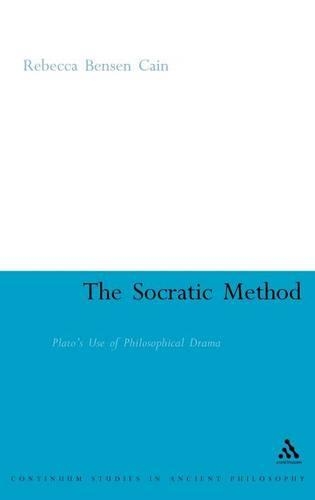
The Socratic Method: Plato's Use of Philosophical Drama
(Hardback)
Publishing Details
The Socratic Method: Plato's Use of Philosophical Drama
By (Author) Rebecca Bensen Cain
Bloomsbury Publishing PLC
Continuum International Publishing Group Ltd.
26th February 2007
United Kingdom
Classifications
Tertiary Education
Non Fiction
184
Physical Properties
Hardback
148
Width 156mm, Height 234mm
390g
Description
This book develops a new account of Socratic method, based on a psychological model of Plato's dramatic depiction of Socrates' character and conduct. Socratic method is seen as a blend of three types of philosophical discourse: refutation, truth-seeking, and persuasion. Cain focuses on the persuasive features of the method since, in her view, it is this aspect of Socrates' method that best explains the content and the value of the dialectical arguments. Emphasizing the persuasive aspect of Socratic method helps us uncover the operative standards of dialectical argumentation in fifth-century Athens. Cain considers both the sophistic style of rhetoric and contentious debate in Socrates' time, and Aristotle's perspective on the techniques of argument and their purposes. An informal, pragmatic analysis of argumentation appropriate to the dialectical context is developed. We see that Socrates uses ambiguity and other strategic fallacies with purposeful play, and for moral ends. Taking specific examples of refutations from Plato's dialogues, Cain links the interlocutors' characters and situations with the dialectical argument that Socrates constructs to refute them. The merit of this interpretation is that it gives broad range, depth, and balance to Socrates' argumentative style; it also maintains a keen sensitivity to the interlocutors' emotional reactions, moral values, and attitudes. The book concludes with a discussion of the overall value, purpose, and success of Socratic method, and draws upon a Platonic/Socratic conception of the soul and a dialectical type of self-knowledge.
Reviews
"There are several laudable features of the book. Unlike much scholarship on Socrates' method, C seeks to recognize the significance of Plato's literary art and to distinguish what Socrates tries to accomplish within a dialogue from what Plato tries to accomplish by having him do so. Unlike that scholarship, too, she aims to look at whole dialogues rather than only parts and to interpret them in a more contextual way (5), by seeing the arguments within the framework of the drama' (51). And she recognizes that there is a complex psycho-dynamics' (4) at work in Socrates' treatment of his interlocutors...The greatest strength of the book...is the careful analyses of particular cases (68-93), of which there could well be more. They show more clearly than any number of argument summaries that and how Plato's Socrates plays on the ambiguity of central terms in these premises and employs psychological strategies to detach his interlocutors from the conventional or sophistic views they bring to the conversation and to re-orient them towards a more Socratic set of beliefs, values, and practices." -Gerald A. Press, Philosophy in Review, 2007
'Readers will be challenged and intrigued by Cain's treatment...' Voula Tsouna, University of California, Santa Barbara * Blurb from reviewer *
'I enthusiastically recommend this bookand look forward eagerly to having a copy on my own bookshelf to consult in my own work.' Nicholas D. Smith, Lewis & Clark College, Portland, OR * Blurb from reviewer *
Author Bio
Rebecca Bensen Cain teaches philosophy at Oklahoma State University, USA. Her previous publications include articles in the Journal of the History of Philosophy and the Southwest Philosophy Review.
